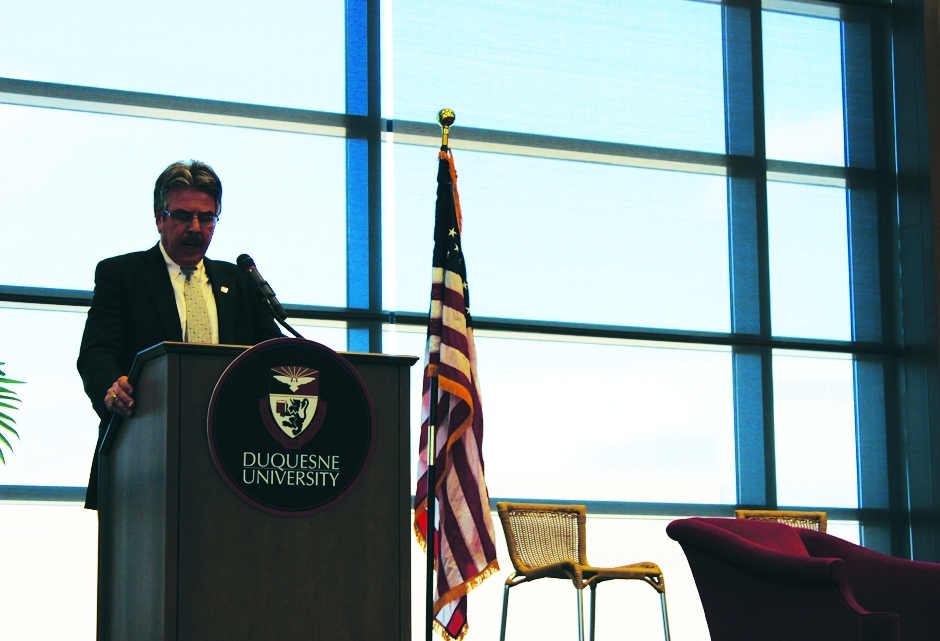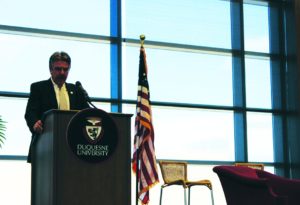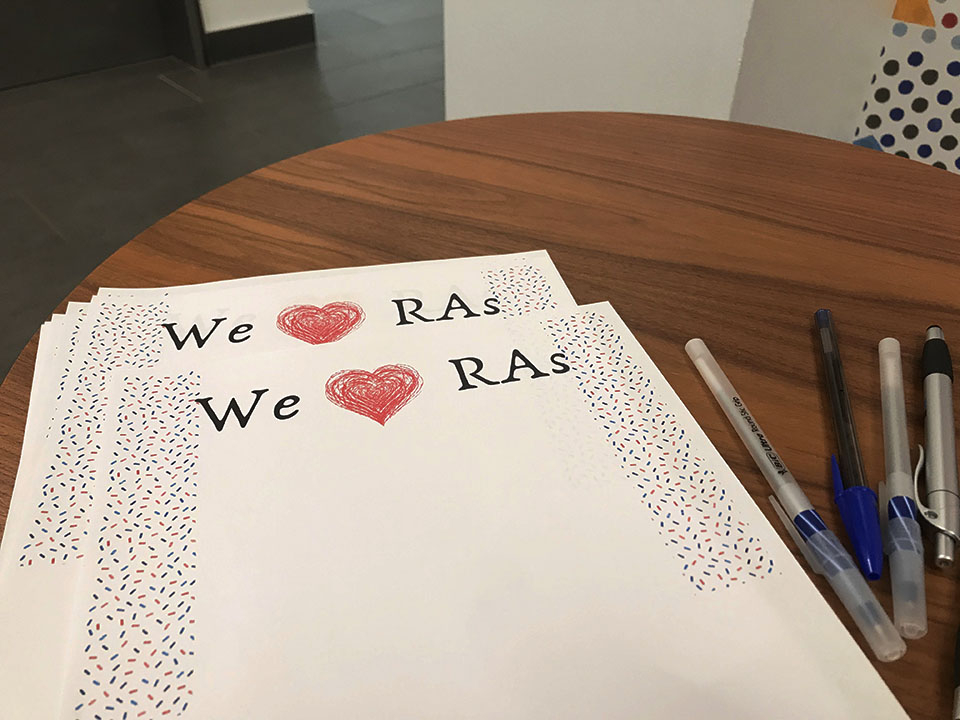
President Gormley addresses a crowd of almost 700 students at the Power Center Ballroom Feb. 13. Gormley did not sign the DACA following a letter from faculty.

President Gormley addresses a crowd of almost 700 students at the Power Center Ballroom Feb. 13. Gormley did not sign the DACA following a letter from faculty.
Craig Taylor | Staff Writer
President Ken Gormley chose not to publicly address a letter sent to him by the Faculty Social Justice Association (SJA) requesting that Duquesne afford special protections to migrant students and faculty.
The letter asked that Duquesne not cooperate with federal immigration officials investigating members of the campus community unless authorized by a court order and to sign a statement in support of the Deferred Action for Childhood Arrivals (DACA) program, which protects immigrants who arrived in the U.S. as children.
The Social Justice Association also asked that Gormley discuss the letter at this week’s “Race and Cultural Understanding in a New Era” event Feb. 13, which he declined to do.
This letter came after Gormley sent out a message of support to the campus community following President Donald Trump’s executive order barring the entry of citizens from seven Muslim-majority countries.
In his response to the Social Justice Association’s concerns, Gormley cited concern over Duquesne losing federal funding as one of the reasons for the university’s apolitical stance.
“We are a private, non-profit, tax exempt institution of higher education,” he said in a letter to SJA coordinator Fred Evans, who is also a philosophy professor at Duquesne. “For that reason, we refrain from engaging in political activity which might jeopardize our tax exempt status.”
Gormley added that it would be “inappropriate” to publicly address “complex legal and administrative issues that are still in flux” at the event, as it would be contrary to the program’s goal.
However, the question of how campus police would respond in the case of a raid by Immigration and Customs Enforcement was one of the topics discussed by panelists, although no concrete answer was given.
After the event, Gormley defended his stance.
“I tried to say it as best I could in the letter … I’m concerned about our students, and our faculty and our staff who are potentially impacted,” he said. “And making statements and taking certain actions because it might look good or sound good isn’t necessarily in the best interest of the people you care about.”
One criticism of Gormley’s position offered by the SJA is that many of the top tier Catholic colleges that are also tax-exempt, non-profit universities have signed onto the DACA, including Notre Dame, Georgetown, Villanova and Providence College.
Gormley said while many presidents immediately responded to the ban, he purposefully waited to consult legal counsel, the Spiritan priests and those in touch with the members of the community potentially impacted to arrive at the decision that he thought best for Duquesne.
“What’s good for one university may not be good for others,” Gormley said. “And again, my job as president of this university is to worry about our students and faculty and staff members. That’s my job.”
He also pointed out he was one of more than 130 other Catholic university presidents to sign a letter from the Association of Catholic Colleges and Universities denouncing the travel ban.
Dan Selcer, a member of the SJA and original drafter of the letter to Gormley, said that although he believes this week’s event was a success, Gormley not publicly responding to the letter was “disappointing.”
“I am also disappointed that he has now several times publicly mischaracterized our letter as if it merely asked him to engage in illegitimate political endorsement or symbolic sloganeering that ‘might look good or sound good,’” he said. “To the contrary, we ask the president of Duquesne University for concrete action on issues directly related to this academic institution and its community of students, staff, and faculty.”
Selcer said it is important for the president to verbalize the university’s willingness to work with immigration officials, as Duquesne’s policy on such issues is unclear.
“I think it’s a reasonable assumption that all or some of them would voluntarily cooperate with immigration officers unless specifically directed otherwise by President Gormley,” Selcer said. “Likewise, absent a statement from President Gormley or explicit policy to the contrary, federal immigration enforcement agents would have no reason to think they aren’t welcome on the Duquesne campus.”
Pennsylvania State Senator Wayne Fontana (D-Allegheny) wrote to President Gormley applauding the SJA’s efforts to protect students.
“Whether these students are documented immigrants or not, I do not see the point in disrupting their lives and educational pursuits,” Fontana said. “While I very much respect your position … I would urge the university to join other schools and academic leaders across the state and nation who have taken a stance in support of all their students against these short-sighted immigration policies.”
Senior English major Trevor Root believes this kind of stance is contradictory to the university’s core value of solidarity.
“The only legitimacy of the university in general is its commitment to the empowerment and wellbeing of its students,” Root said. “If President Gormley chooses to claim tax status as a scapegoat for refusing to protect the university’s students from oppression of any kind, he forfeits the legitimacy of the university as a whole.”
However, Joshua Lamonde, senior economics major, understands Gormley’s decision to keep Duquesne out of politics.
“I think that this is the only response that can be warranted from a university president that truly cares for his institution,” Lamonde said. “As a president, he is expected to care for and promote the longevity and prosperity of his school. By keeping Duquesne out of the political spotlight, he is doing just that.”
Even still, Selcer worries that Gormley’s supportive words following the executive order will prove gilded if not acted on.
“Such admirable sentiments risk remaining empty until the University takes concrete steps to live up to these ethical obligations. If President Gormley is willing to endorse these principles, he should also be willing to endorse the policies that would give them meaning,” he said.
However, Gormley maintains that not taking an overt stance does not signal a lack of support.
“There are hundreds of other things that a college president could sign, but just signing things doesn’t necessarily accomplish anything, and that’s what I want people to understand,” he said. “This is serious business and we care about people impacted, and I’m not going to take steps just because of political theater.”



